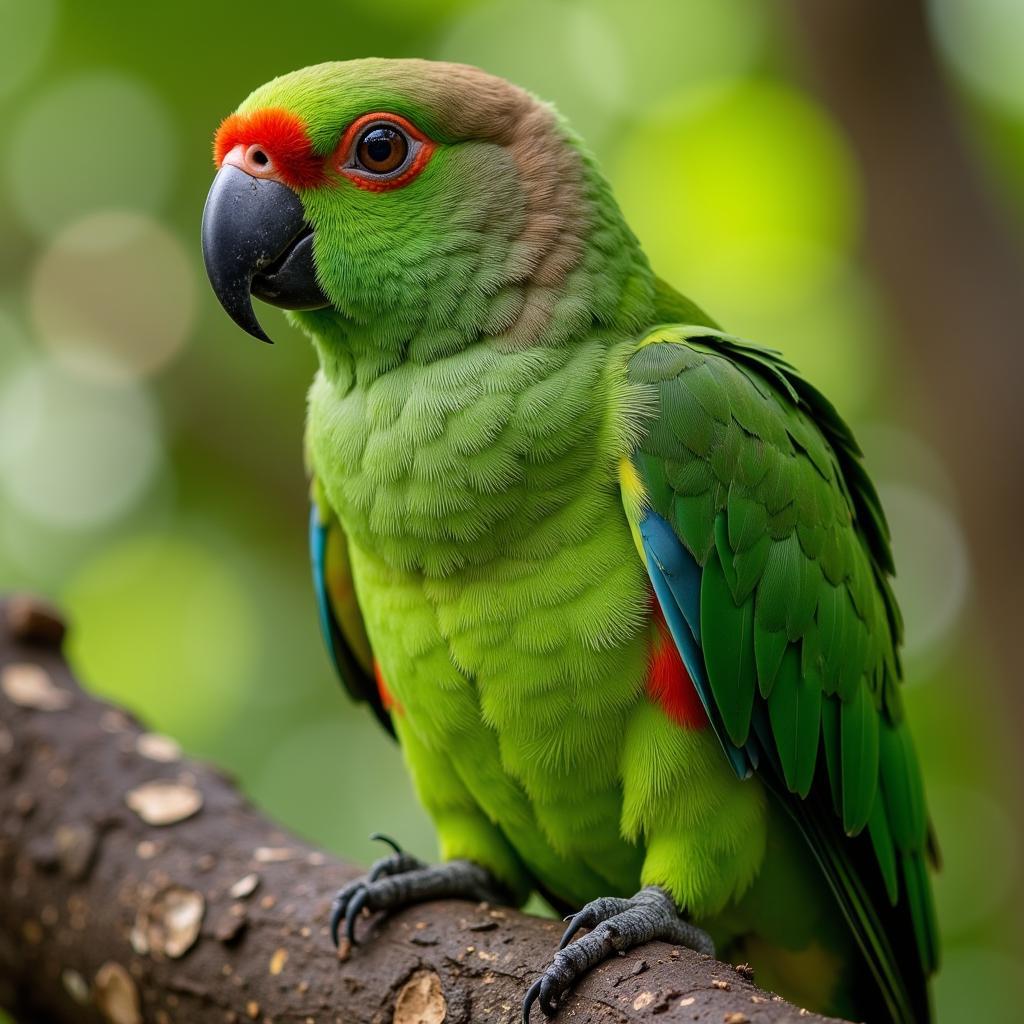Unveiling the African Brow-Headed Parrot
The African brow-headed parrot, a vibrant and intelligent species, offers a captivating glimpse into the rich biodiversity of the African continent. From their unique physical characteristics to their complex social behaviors, these birds hold a special place in the hearts of bird enthusiasts and researchers alike.  African Brow-headed Parrot Perching on a Branch
African Brow-headed Parrot Perching on a Branch
Discovering the African Brow-Headed Parrot: Habitat and Characteristics
The African brow-headed parrot, scientifically known as Poicephalus meyeri, is native to various regions across sub-Saharan Africa. These regions include savannas, woodlands, and forested areas. Adaptable and resourceful, they thrive in a variety of environments, showcasing their resilience in the face of changing landscapes. Their distinctive brown head, from which they derive their name, sets them apart from other parrot species. Their vibrant green plumage, complemented by splashes of blue or yellow on their wings and tail, adds to their striking beauty.
These parrots are relatively small, averaging around 22-25 centimeters in length. Their compact size allows them to navigate dense foliage with ease, while their strong beaks enable them to crack open nuts and seeds, a crucial part of their diet.
The Social Life of the African Brow-Headed Parrot
African brow-headed parrots are highly social creatures, often seen in flocks or pairs, exhibiting strong bonds and complex communication. Their vocalizations, a mix of whistles, chirps, and squawks, are integral to their social interactions, serving to maintain group cohesion and warn of potential dangers. These birds form monogamous pair bonds, often mating for life. They work together to raise their young, sharing the responsibilities of nest building, incubation, and feeding.
What Makes the African Brow-Headed Parrot Unique?
Several key characteristics distinguish the African brow-headed parrot from other parrot species. Their specialized diet, primarily consisting of seeds, fruits, and nuts, showcases their adaptation to the diverse food sources available in their habitats. Their intelligence and ability to mimic sounds, though not as pronounced as some other parrot species, still make them engaging companions. What sets them truly apart is their resilience. They can thrive in a wider range of environments than many other parrots, demonstrating a remarkable adaptability that contributes to their survival.
Like the African conure, the African brow-headed parrot displays an intriguing social dynamic within their flocks. They establish hierarchies and complex communication patterns that continue to fascinate researchers. Studying these patterns allows us a glimpse into the intricate world of avian social structures.
Are African Brow-Headed Parrots Good Pets?
While their vibrant colors and intriguing personalities might make them seem appealing pets, the African brow-headed parrot has specific needs that may be challenging for the average pet owner. Their strong social needs require significant attention and interaction, and their specialized diet needs careful attention.
“Understanding the needs of these birds is paramount before considering them as pets,” says Dr. Anika Sharma, a renowned ornithologist specializing in African parrot species. “Their complex social needs and specific dietary requirements necessitate a dedicated and knowledgeable owner.”
Conserving the African Brow-Headed Parrot
While currently not considered endangered, the African brow-headed parrot faces increasing threats due to habitat loss and the illegal pet trade. Conservation efforts are crucial to ensure the long-term survival of this vibrant species. Supporting organizations dedicated to protecting African wildlife and their habitats is essential. Learning about African American civil rights movement leaders can inspire a commitment to protecting vulnerable species. Raising awareness about the importance of conservation and responsible pet ownership can also contribute to the protection of the African brow-headed parrot. Exploring other fascinating aspects of African culture, like the African drum set and the African parrot, can further enrich our understanding and appreciation of this diverse continent.
“The African brow-headed parrot plays a crucial role in its ecosystem,” explains Professor Kwame Nkrumah, an expert in African biodiversity. “Protecting their habitat is not just about saving a single species, but preserving the delicate balance of the entire ecosystem.” Learning interesting African American history facts can also broaden our understanding of cultural connections and the importance of preservation.
In conclusion, the African brow-headed parrot offers a fascinating window into the vibrant world of African wildlife. From their unique physical characteristics to their complex social behaviors, these birds deserve our attention and protection. By understanding their needs and supporting conservation efforts, we can help ensure that future generations can continue to marvel at the beauty and intelligence of the African brow-headed parrot.
FAQ
- What does the African brow-headed parrot eat?
- Primarily seeds, fruits, and nuts.
- Where do African brow-headed parrots live?
- Sub-Saharan Africa, in savannas, woodlands, and forests.
- Are African brow-headed parrots endangered?
- Not currently, but they face threats from habitat loss and the pet trade.
- What are the unique characteristics of the African brow-headed parrot?
- Distinctive brown head, vibrant green plumage, and adaptability to various habitats.
- Are African brow-headed parrots good pets?
- Their complex needs require a dedicated and knowledgeable owner.
- How can I help conserve the African brow-headed parrot?
- Support conservation organizations and promote responsible pet ownership.
- What is the scientific name of the African brow-headed parrot?
- Poicephalus meyeri.
Need assistance? Contact us 24/7: Phone: +255768904061, Email: kaka.mag@gmail.com or visit us at Mbarali DC Mawindi, Kangaga, Tanzania.


